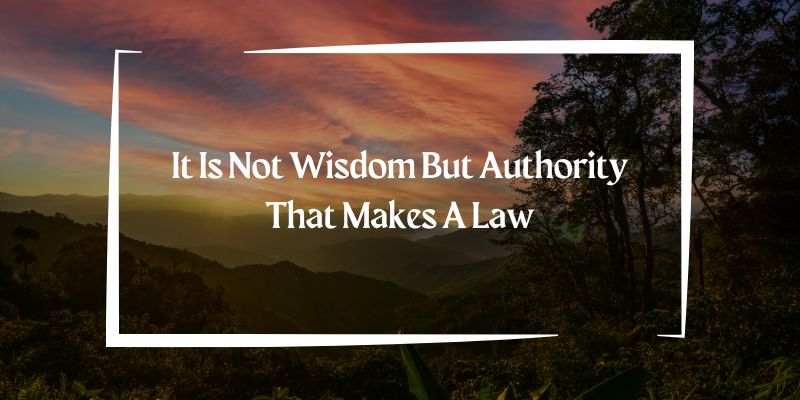Introduction:
It is Not Wisdom but Authority that Makes a Law: Unraveling the Tymoff Paradox, In the intricate tapestry of governance and legal systems, the quote “It is not wisdom but authority that makes a law” by Tymoff challenges our conventional understanding of the legislative process. This thought-provoking statement prompts us to delve into the dynamics between wisdom and authority, questioning the very essence of how laws are formulated and implemented in societies across the globe.

Understanding the Tymoff Paradox:
Tymoff’s assertion challenges the traditional belief that laws are born out of wisdom, careful consideration, and a deep understanding of societal needs. Instead, he posits that authority, perhaps wielded by those in power, holds the primary sway in the creation of laws. To comprehend the Tymoff Paradox, we must scrutinize the roles of wisdom and authority in the legislative sphere.
must read=indícame el camino a la tienda de alimentos más cercana
The Role of Wisdom in Lawmaking:
Historically, the conception of laws has often been associated with the wisdom of learned individuals, scholars, and jurists. The idea is that laws should reflect a profound understanding of human nature, societal norms, and ethical principles. Wisdom in lawmaking implies a comprehensive analysis of the consequences of proposed regulations and their alignment with the values of justice and fairness.
Wisdom in law can manifest in various forms, from the codification of longstanding societal customs to the incorporation of contemporary ethical insights. The historical evolution of legal systems often reflects the accumulation of societal wisdom, as lawmakers draw upon past experiences to shape the present and future. However, the Tymoff Paradox challenges the notion that wisdom alone is the driving force behind the creation of laws.

The Dominance of Authority in Legislation:
Contrary to the emphasis on wisdom, Tymoff suggests that authority plays a pivotal role in the formulation and enforcement of laws. Authority can emanate from various sources, including governments, ruling bodies, or institutional structures. The Tymoff Paradox prompts us to scrutinize whether laws are sometimes crafted to consolidate power rather than to serve the greater good of society.
One could argue that authority, when concentrated in the hands of a few, has the potential to shape laws that perpetuate existing power structures. This raises concerns about the legitimacy and fairness of laws, particularly in societies where power imbalances are pronounced. Understanding the interplay between authority and wisdom is crucial in evaluating the true motivations behind legislative actions.
Examples from History and Contemporary Society:
To illustrate the Tymoff Paradox, it is illuminating to examine historical and contemporary examples where the relationship between wisdom and authority in lawmaking comes into focus.
Historically, monarchies and autocratic regimes often wielded authority to impose laws that served their interests, sometimes at the expense of societal well-being. In contrast, democratic societies claim to prioritize the wisdom of the people through representation and deliberative processes. However, even in democracies, the influence of authority figures and institutions can sometimes overshadow the collective wisdom of the populace.
In recent times, debates surrounding controversial laws, such as those pertaining to civil rights, environmental regulations, and surveillance, highlight the tension between wisdom and authority. Advocates argue that some laws are enacted to consolidate authority or appease powerful interests rather than address the genuine concerns and wisdom of the people.

Navigating the Paradox: Striking a Balance:
The Tymoff Paradox invites us to reflect on the delicate equilibrium between wisdom and authority in the realm of law. While wisdom contributes to the ethical and just foundations of legislation, authority provides the necessary framework for the implementation and enforcement of laws. Striking a balance between these two elements is essential for a legal system that is both fair and effective.
In democratic societies, the Tymoff Paradox underscores the importance of ensuring that authority is derived from the collective wisdom of the people. Transparent and inclusive decision-making processes, coupled with checks and balances, can help prevent the undue concentration of authority that might undermine the true spirit of representative governance.
Moreover, legal education and public awareness play crucial roles in empowering individuals to contribute to the wisdom underlying laws. A society that values informed citizenship is better equipped to hold authorities accountable and actively participate in shaping legislation that reflects collective wisdom.
Conclusion:
The Tymoff Paradox challenges us to reevaluate our understanding of the forces that drive the creation of laws. Wisdom and authority, far from being mutually exclusive, must coexist harmoniously to ensure a legal system that is just, fair, and reflective of the values and aspirations of society. As we navigate the intricate web of governance, the Tymoff Paradox serves as a reminder that true legal enlightenment lies in the delicate interplay between the wisdom of the governed and the judicious exercise of authority by those in power.
